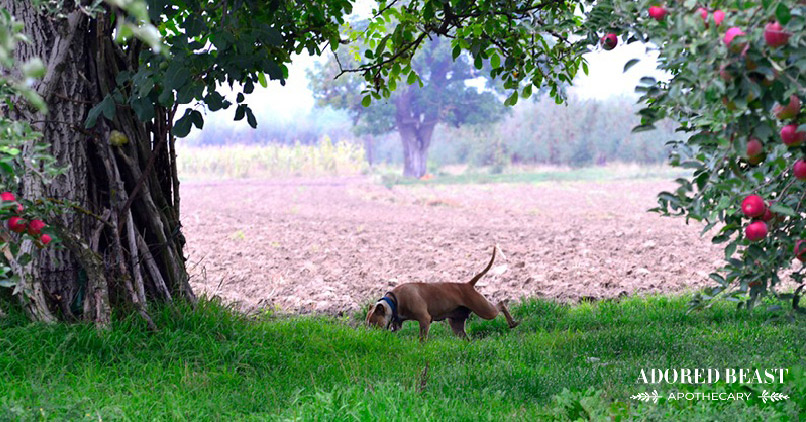Have you ever heard about people using apple cider vinegar for dogs? Have you wondered why someone might choose to add vinegar to a pet’s diet?
Apple cider vinegar may not be what you first think of when you think of healthy additions for your pets, but this is a centuries-old, all-around health tonic!
Put simply, apple cider vinegar (ACV) is fermented apple juice. When adding yeast into the liquid, it converts the sugars present into alcohol. The bacteria further ferment the alcohol into acetic acid, which is the main element in vinegar. ACV is around 5-6% acetic acid.
Benefits of Apple Cider Vinegar for Dogs
Can dogs have apple cider vinegar? Yes! In fact, there are several great reasons to add apple cider vinegar for dogs to your regular supplement rotation.
1. The Mother
Raw unfiltered ACV develops something called “The Mother” which is strands of proteins, enzymes, and bacteria that give the vinegar its murky appearance. Even though there are no current studies on this, it is believed that the mother is what gives the vinegar all the health benefits.
2. Anti-Microbial and Anti-Bacterial
Traditionally, vinegar has been used for sanitization, cleaning, and healing imbalances for centuries. Even Hippocrates, the father of medicine, used vinegar to clean wounds over 2,000 years ago. This is because ACV inhibits the growth of pathogenic, or harmful, bacteria such as E. Coli from foods.
3. Improves Heart Health
ACV has been shown to aid in lowering the chances of metabolic diseases such as high blood sugar, diabetes, and heart disease.
Several studies have shown that ACV can improve heart health in animals, lower cholesterol levels, triglyceride levels, blood pressure, and many other risk factors.
Research also shows that vinegar can help with insulin sensitivity as it significantly reduces the blood sugar and insulin response during a high carbohydrate meal. This is good news for dogs who eat kibble!
4. Skin Health
ACV is a very common and natural treatment for skin conditions such as yeast, eczema, and dry skin. This is thanks to its antibacterial and antimicrobial properties which can be essential when dealing with problems such as yeast.
When ACV is used as a topical, it brings balance to the skin’s pH and improves the protective barriers. But make sure to dilute the ACV with water when used topically and when in doubt, ask your holistic or integrative vet!
5. Digestion
My favorite benefit of ACV is its ability to aid in the digestive process. Since ACV is naturally acidic, it helps balance the pH of the stomach, prevents bloating and gas, and also helps kill bacteria in the stomach and intestines due to its antimicrobial properties.
What to Buy
When you go to the store to pick up some apple cider vinegar for dogs there are hundreds of different brands claiming all different things (much like the pet food industry…). So here are a couple of points you should keep an eye out for when choosing your ACV.
- Raw and Unpasteurized: The process of pasteurization uses heat to destroy all the benefits of vinegar! Make sure to find one that specifically says “raw and unpasteurized”.
- The murkier the better: When choosing your bottle of ACV, choose the grossest, ugliest, murkiest one you can find! The shinier and more uniform the vinegar is, the fewer benefits there are.
- The Mother: As mentioned before, the mother is the most important part! In addition to what is mentioned above, the most vital part is that the mother is in the vinegar. And generally, if the mother is in the vinegar, it will automatically also be raw and unpasteurized and be murky!
How to Use Apple Cider Vinegar for Dogs
You can use apple cider vinegar both internally and topically!
Two tips to remember:
- Although ACV is all around a safe to consume food, it still is an acidic substance. This means that when given in large amounts it can damage teeth enamel, digestive upset, and throat irritation. When it comes to apple cider vinegar: less is more!
- Dilution is vital – you never want to give or use undiluted ACV – it is just too much for your furry friend.
The best part about ACV is that it’s super easy to add into your animal’s rotation! You can add in a splash of ACV into their water bowl (around ½ tsp per 1 liter of water), to DIY veggie mixes, and even to bone broth!
Or, just add it right to their dinner – here’s a good basis for amounts:
- 1 tsp for up to 14 lbs of body weight
- 2 tsp for 15 to 34 lbs of body weight
- 1 tbsp for 35 to 84 lbs of body weight
Start slowly, and work up to these amounts. While not common, some pets may be sensitive to apple cider vinegar, so you want to give it time and keep an eye out for any changes.
To use it topically, mix a 50/50 solution of water and vinegar and wipe the area with the solution. Be sure not to use it on open cuts or wounds – remember, it’s vinegar, so it’ll sting!
While apple cider vinegar for dogs is by no means an all around replacement for proper medical treatment, it is a natural tool that you can to incorporate into the daily routine for a more holistic approach!












